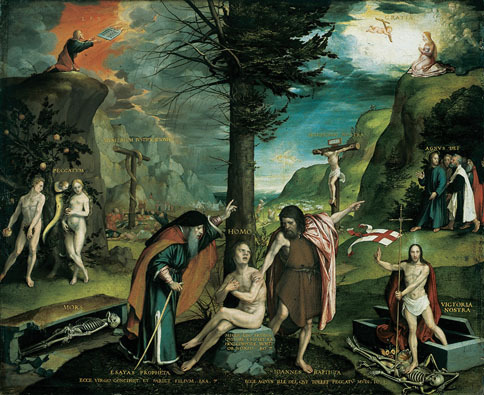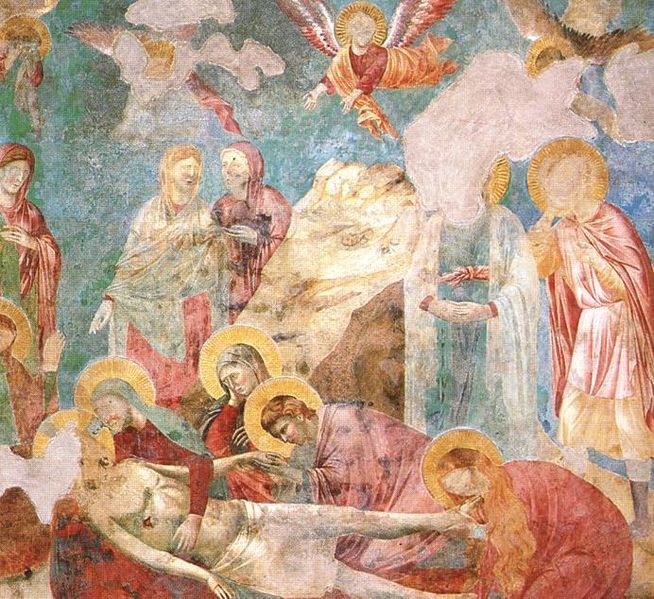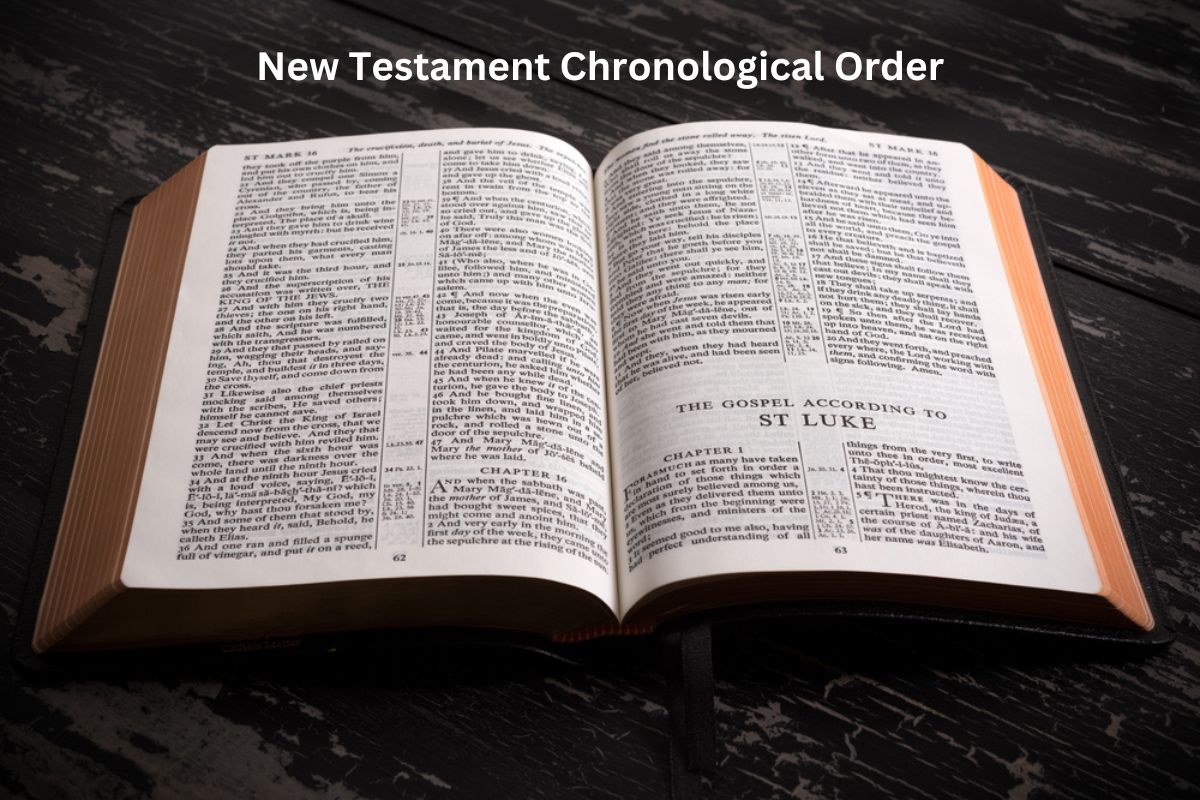The New Testament of the Bible is a collection of 27 books that form the basis of Christian faith and doctrine.
While these books are traditionally organized by type rather than strict chronological order, understanding their estimated composition dates can provide valuable context for readers.
Here, we present a chronological overview of the New Testament, showing the approximate order in which these books were written.
This timeline spans from the earliest writings, such as the letters of Paul, to the later works like the Book of Revelation, offering insights into the development of Christian thought and theology during the first century AD.
| Book | Estimated Composition Date |
|---|---|
| Galatians | c. 49-55 AD |
| 1 Thessalonians | c. 50-51 AD |
| 2 Thessalonians | c. 51 AD |
| 1 Corinthians | c. 53-54 AD |
| 2 Corinthians | c. 55-56 AD |
| Romans | c. 56-57 AD |
| Mark | c. 60-70 AD |
| Philemon | c. 60-62 AD |
| Colossians | c. 60-62 AD |
| Ephesians | c. 60-62 AD |
| Matthew | c. 60-70 AD |
| Luke | c. 60-70 AD |
| Acts | c. 60-70 AD |
| 1 Timothy | c. 62-66 AD |
| Titus | c. 62-66 AD |
| 2 Timothy | c. 62-66 AD |
| 1 Peter | c. 63-64 AD |
| 2 Peter | c. 63-68 AD |
| Hebrews | c. 60-70 AD |
| James | c. 60-70 AD |
| Jude | c. 60-70 AD |
| Revelation | c. 70-95 AD |
| John | c. 85-95 AD |
| 1 John | c. 85-95 AD |
| 2 John | c. 85-95 AD |
| 3 John | c. 85-95 AD |
Chronological Order of the New Testament
Galatians (Estimated Composition Date: c. 49-55 AD)
Author: The Apostle Paul
Key Themes: Galatians is a letter written by the Apostle Paul to the churches in Galatia. It addresses important theological issues, particularly the relationship between faith and works in salvation. Paul emphasizes salvation by faith in Jesus Christ rather than by observing the Jewish law.

1 Thessalonians (Estimated Composition Date: c. 50-51 AD)
Author: The Apostle Paul
Key Themes: This is one of Paul’s earliest letters. It focuses on topics such as the second coming of Christ, Christian conduct, and the importance of living in anticipation of Jesus’ return.
2 Thessalonians (Estimated Composition Date: c. 51 AD)
Author: The Apostle Paul
Key Themes: This letter is a follow-up to 1 Thessalonians and deals with similar themes, including the return of Christ and the importance of living in readiness for His coming.
1 Corinthians (Estimated Composition Date: c. 53-54 AD)
Author: The Apostle Paul
Key Themes: 1 Corinthians addresses a variety of issues within the Corinthian church, including divisions, immorality, lawsuits among believers, and the proper conduct of worship services. It also contains Paul’s famous chapter on love (1 Corinthians 13).
2 Corinthians (Estimated Composition Date: c. 55-56 AD)
Author: The Apostle Paul
Key Themes: 2 Corinthians is Paul’s second letter to the Corinthians, in which he continues to address issues in the Corinthian church and defends his apostolic authority.
Also Read: The Old Testament Timeline
It also emphasizes the concept of God’s strength being made perfect in weakness.
Romans (Estimated Composition Date: c. 56-57 AD)
Author: The Apostle Paul
Key Themes: Romans is often considered one of the most significant books in the New Testament. It delves deeply into the doctrine of salvation by grace through faith in Jesus Christ.
Also Read: Timeline of the Apostle Paul’s Missionary Journey
Paul discusses the righteousness of God, the universality of sin, the role of faith, and the relationship between Jews and Gentiles in God’s plan of salvation.

Mark (Estimated Composition Date: c. 60-70 AD)
Author: Traditionally attributed to John Mark, a companion of Peter
Key Themes: The Gospel of Mark is one of the four canonical Gospels and provides a concise account of the life and ministry of Jesus Christ. It emphasizes Jesus’ actions and miracles and presents a vivid portrait of His teachings and the challenges He faced.
Philemon (Estimated Composition Date: c. 60-62 AD)
Author: The Apostle Paul
Key Themes: Philemon is a short letter written by Paul to Philemon, a Christian slave owner. In the letter, Paul appeals to Philemon to receive his runaway slave, Onesimus, as a brother in Christ, urging him to show love and forgiveness.
Colossians (Estimated Composition Date: c. 60-62 AD)
Author: The Apostle Paul
Key Themes: Colossians focuses on the supremacy of Christ. Paul emphasizes the deity of Jesus and encourages believers to live in light of their union with Him. The letter also addresses various ethical and practical matters.
Ephesians (Estimated Composition Date: c. 60-62 AD)
Author: The Apostle Paul
Key Themes: Ephesians explores the concept of the “mystery of Christ,” highlighting God’s plan to unite both Jews and Gentiles in Christ. The letter addresses topics such as the unity of the church, spiritual warfare, and the roles of believers within the body of Christ.
Matthew (Estimated Composition Date: c. 60-70 AD)
Author: Traditionally attributed to the Apostle Matthew
Key Themes: The Gospel of Matthew is the first book in the New Testament and presents a detailed account of the life, teachings, and ministry of Jesus Christ. It emphasizes Jesus as the Messiah, fulfilling Old Testament prophecies, and provides the Sermon on the Mount, a collection of Jesus’ teachings on various topics.

Luke (Estimated Composition Date: c. 60-70 AD)
Author: Traditionally attributed to Luke, a physician and companion of the Apostle Paul
Key Themes: The Gospel of Luke offers a comprehensive narrative of Jesus’ life and ministry, including parables and stories not found in the other Gospels. Luke also wrote the Acts of the Apostles, which chronicles the early history of the Christian church.
Acts (Estimated Composition Date: c. 60-70 AD)
Author: Traditionally attributed to Luke
Key Themes: The Book of Acts follows the spread of Christianity from its origins in Jerusalem to other parts of the Roman Empire. It focuses on the ministry of the apostles, especially Peter and Paul, and highlights the role of the Holy Spirit in the early church.
1 Timothy (Estimated Composition Date: c. 62-66 AD)
Author: The Apostle Paul
Key Themes: 1 Timothy is one of the Pastoral Epistles, written by Paul to his young protege Timothy. It addresses issues related to church leadership, proper conduct within the church, and the qualifications and responsibilities of elders and deacons.
Titus (Estimated Composition Date: c. 62-66 AD)
Author: The Apostle Paul
Key Themes: Titus, another of the Pastoral Epistles, is directed toward Titus, a fellow worker of Paul. The letter discusses the appointment of church leaders, sound doctrine, and practical Christian living.
2 Timothy (Estimated Composition Date: c. 62-66 AD)
Author: The Apostle Paul
Key Themes: 2 Timothy is the final letter written by Paul to Timothy, his beloved disciple. In this letter, Paul encourages Timothy to remain faithful and steadfast in his ministry, even in the face of adversity. He also reflects on his own impending martyrdom.
1 Peter (Estimated Composition Date: c. 63-64 AD)
Author: The Apostle Peter
Key Themes: 1 Peter is a letter written by the Apostle Peter to encourage and strengthen persecuted Christians. It emphasizes the believers’ living hope in Christ, their identity as a chosen people, and the call to live holy lives as witnesses to their faith.

2 Peter (Estimated Composition Date: c. 63-68 AD)
Author: The Apostle Peter
Key Themes: 2 Peter addresses issues related to false teachers and the importance of discerning true doctrine. It underscores the reliability of the Scriptures and the certainty of God’s judgment.
Hebrews (Estimated Composition Date: c. 60-70 AD)
Author: The author of Hebrews is unknown, but it is traditionally attributed to Paul or someone closely associated with him.
Key Themes: Hebrews explores the superiority of Christ over the Old Testament system, including the priesthood, sacrifices, and covenant. It highlights the concept of faith and the need for perseverance in the Christian journey.
James (Estimated Composition Date: c. 60-70 AD)
Author: Traditionally attributed to James, the brother of Jesus
Key Themes: The Epistle of James offers practical advice on Christian living, emphasizing the importance of faith that is demonstrated through good works. It addresses issues such as trials, temptation, and the use of the tongue.
Jude (Estimated Composition Date: c. 60-70 AD)
Author: Traditionally attributed to Jude, a brother of James and Jesus
Key Themes: The Epistle of Jude is a short letter that warns against false teachers and encourages believers to contend for the faith once delivered to the saints. It draws on Old Testament and extra-biblical sources to illustrate the consequences of false teaching.
Revelation (Estimated Composition Date: c. 70-95 AD)
Author: The Apostle John
Key Themes: The Book of Revelation is a prophetic and apocalyptic work that contains visions and symbols. It is centered around the revelation of Jesus Christ’s return and the ultimate triumph of God over evil. It offers encouragement to persecuted Christians and portrays the final judgment and the establishment of God’s eternal kingdom.
John (Estimated Composition Date: c. 85-95 AD)
Author: Traditionally attributed to the Apostle John
Key Themes: The Gospel of John presents a unique perspective on the life and teachings of Jesus Christ. It emphasizes the divinity of Jesus, often using the phrase “I am” to describe His identity. The Gospel also includes the famous “I am the way, the truth, and the life” statement (John 14:6) and the high priestly prayer of Jesus (John 17).
1 John (Estimated Composition Date: c. 85-95 AD)
Author: Traditionally attributed to the Apostle John
Key Themes: 1 John explores themes of love, fellowship, and assurance of salvation. It emphasizes the importance of loving one another and the need for believers to walk in the light and truth of Christ.
2 John (Estimated Composition Date: c. 85-95 AD)
Author: Traditionally attributed to the Apostle John
Key Themes: 2 John is a short letter that emphasizes the importance of walking in truth and love. It warns against receiving false teachers and encourages believers to remain faithful to the teachings of Christ.
3 John (Estimated Composition Date: c. 85-95 AD)
Author: Traditionally attributed to the Apostle John
Key Themes: 3 John is a brief letter that commends Gaius for his hospitality and support of itinerant missionaries. It contrasts Gaius’s commendable behavior with the negative actions of Diotrephes, who rejected the authority of John and his associates
